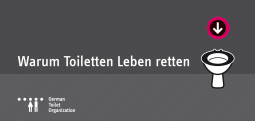Facts & Figures

Why
Why are we the German TOILET Organization?
Sanitation is a human right and an integral part of the triad of water, sanitation and hygiene (WASH). In the context of humanitarian assistance, WASH is a lifesaver; in terms of development cooperation, it is the foundation for all development. The challenges of the global sanitation crisis are so daunting and the path to its resolution so complex that it requires well coordinated efforts by all stakeholders to address them.
Toilets need to set a precedent, because improved sanitation has the power to promote social and economic development, increase educational opportunities and ensure greater equality.
Basic sanitation is the best preventive medicine.

Toilets, hand washing and the proper handling of human excreta can prevent life-threatening diarrhoeal diseases, cholera, typhoid fever and worm infections. According to the WHO, almost half of the deaths of malnourished children under the age of 5 are due to inadequate sanitation and hygiene conditions.
By preventing numerous diseases and deaths, basic sanitation alleviates the constant fear for the lives of relatives and fellow human beings.
Basic sanitation and clean drinking water can save 1000 children under the age of 5 every day.
Basic sanitation contributes to equality, education and human dignity.

Toilets offer privacy and protect women from attacks they would be exposed to outdoors. As women in many cultures take care of the sick at home, they benefit particularly from a healthy society. They themselves remain healthy and have more time to gain education and contribute to the well-being of their families.
Sanitation facilities contribute to poverty reduction by protecting health and the ability to work. Adequate toilets ensure that children can continue to go to school - especially girls during menstruation. Education is the basic prerequisite for positive development.
Unfortunately, according to the WHO and UNICEF, over 400,000,000 children worldwide lack basic sanitation facilities
at their schools.
Basic sanitation reduces poverty and promotes economic growth.

Access to toilets saves a lot of time that would otherwise be lost searching for a remote hiding place. More effective working time means a higher income. Healthy children spend more time in school and increase the educational level of society. Sanitation protects water resources and soil from pollution, which in turn increases regional economic potential.
The use of human excreta as a raw material promotes economic growth. Treated faeces are excellent fertilisers and are suitable for the production of biogas, i.e. renewable energy. The recycling of treated wastewater saves water resources.
Every US$ invested in basic sanitation generates 4.3 times the value. (source: WHO)
Basic sanitation enables sustainable settlements and protects our environment.

The treatment of faeces and other waste water protects drinking water reserves and ecosystems. Basic sanitation thus enables clean and healthy habitats.
Sanitation systems can enable sustainable agricultural production by returning treated excrements to the fields as fertiliser. This saves energy and protects limited phosphorus deposits required for the production of artificial fertilizers. The fermentation of faeces and biowaste produces biogas, a renewable energy source that reduces CO2 emissions.
Worldwide basic sanitation can prevent over hundreds of thousand of tonnes of untreated faeces from being discharged into nature every day.
Basic sanitation combats hunger
Lack of access to sanitation and water, as well as inadequate hygiene, are hidden causes of malnutrition. People with recurrent diarrhoea are less able to absorb and utilize nutrients from food.
Almost half of all deaths of children under the age of five are associated with malnutrition. Poor sanitary and hygiene conditions are often the reason for inhibited growth and underweight. The consequences are physical and mental impairments.
Every year, around 564,000 people die due to higher rates of disease caused by inadequate sanitation, particularly diarrhoeal diseases. Improved sanitation also strengthens the nutritional status of expectant mothers and thus reduces the risk of giving birth to underdeveloped children.
Facts
- 4,5billionpeople around the world live without safe sanitation.
- 892Mio.people defecate outdoors.
- 2.1billionpeople around the world have no access to clean drinking water.
***statistical figures from WHO and UNICEF
A life without a toilet? Unthinkable. Basic sanitation is a human right.